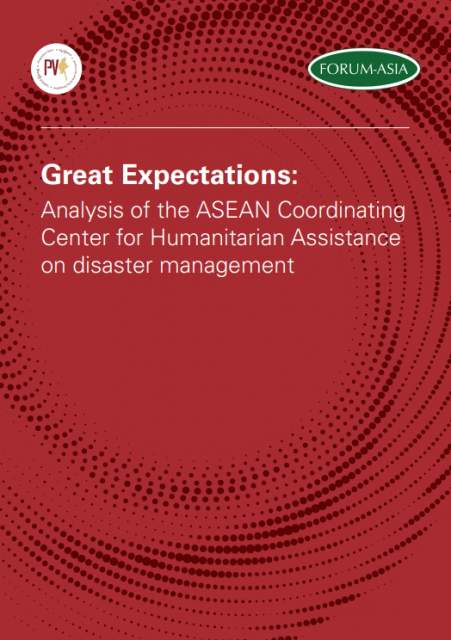Report
2954 Views
Great Expectations: Analysis of the ASEAN Coordinating Center for Humanitarian Assistance on disaster management
August 4th, 2021 •
Author:
FORUM-ASIA
,
Progressive Voice
•
3 minute read


This briefing paper will summarize the dire humanitarian crises created by the Myanmar military since the attempted coup, outline ASEAN’s response, analyze the role of the ASEAN Coordinating Centre for Humanitarian Assistance on disaster management (AHA Centre) and discuss some implications for ASEAN and the wider humanitarian sector’s response moving forward. A set of recommendations to expedite response for the Myanmar humanitarian crisis will be outlineoutlined at the end of this briefing paper.
Key Messages:
- Six months since the attempted coup, little concrete action has been taken by the UN Security Council to address the unfolding human rights, humanitarian, and COVID-19 crisis in Myanmar. Rather, the UN and governments have defaulted to the regional bloc, ASEAN, to take the lead on a diplomatic and humanitarian response. Yet, 100 days since the Five Point Consensus between ASEAN leaders and Myanmar’s junta leader, Senior General Min Aung Hlaing was reached during the ASEAN Leaders’ Meeting on 24 April, 2021, there has been no swift implementation of the Five Point Consensus – with the selection of Special Envoy to Myanmar at a deadlock.
- The ASEAN Coordinating Centre for Humanitarian Assistance on disaster management (AHA Centre) is an inter-governmental ASEAN body established in 2011 and its primary partners are national level, National Disaster Management Organisations (NDMOs) in respective ASEAN states. AHA Centre is funded by ASEAN states and its Standard Operating Procedure for Regional Standby Arrangements and Coordination of Joint Disaster Relief and Emergency Response Operations (SASOP) allows Myanmar as a receiving party to “exercise the overall direction, control, coordination and supervision of the assistance within its territory.” Myanmar’s role in AHA Centre’s Governing Board also points to a lack of independence, allowing Myanmar to dictate the terms under which AHA Centre operates, including who the AHA Centre works with in provision of humanitarian aid.
- The operations of AHA Centre is deeply problematic in tackling the current humanitarian crisis in Myanmar because those who remain the root causes of the humanitarian crisis funds, approves and is partner in carrying out the assistance.
- Reflecting upon AHA Centre’s previous response in Rakhine State during the Rohingya crisis, and in considering its mandate for disaster response – with little conflict-related experience – the AHA Centre is not geared towards responding to a “man-made” humanitarian crisis caused by conflict and state-sponsored violence.
- There are several risks in channeling aid through AHA Centre. This includes: strengthening junta’s position regionally and internationally; emboldening the junta to present themselves as the protector of the people and further its own political agenda; provision of highly restrictive and controlled aid; people refusing to accept aid due to lack of trust; the military hoarding aid or COVID-19 supplies for themselves and their families.
- Instead of providing humanitarian aid and COVID-19 supplies through AHA Centre, ASEAN and international community can provide assistance through the newly through the newly established COVID-19 Task Force, jointly established by the interim government of Myanmar – the National Unity Government – and Ethnic Health Organziations, as well as through cross-border channels, local humanitarian networks, ethnic service providers, community-based and civil society organizations.

